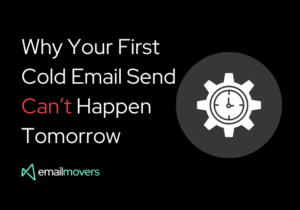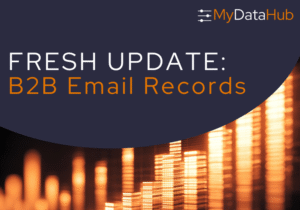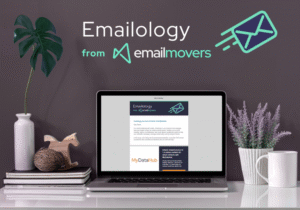Despite advances in technology email remains a vital tool for businesses. Further still, email marketing is just as effective today as it was in the beginning. Aiming to scale and retain loyal customers while utilising an email campaign as a small business is essential.
However, achieving email marketing success isn’t just about hitting the send button. It requires strategic choices around email providers, append services, and efficient email campaign management to get the best results for growing businesses. This article explores key practices to help small businesses use email effectively, with tips on selecting the best email provider in the UK, understanding email append services, and maximising customer engagement.
1. Selecting the Best Email Provider for Small Businesses
Choosing the right email provider can be one of the most crucial decisions for small businesses, as it lays the foundation for effective communication with customers. The best email provider for small business in the UK is more than just a platform to send messages; it is a comprehensive tool that supports business goals and drives engagement through advanced functionalities tailored for small to medium-sized enterprises. Here are the core factors to consider when selecting an email provider:
Reliability and Deliverability Rates
Deliverability refers to the ability of an email provider to ensure that messages land in the recipient’s inbox rather than the spam folder. High deliverability rates are crucial because even the most well-crafted email campaigns are useless if they aren’t seen by recipients. Email providers offering high deliverability rates often have a strong reputation and well-established relationships with major internet service providers (ISPs), helping to secure better inbox placement. Additionally, these providers usually include authentication features like SPF, DKIM, and DMARC, which further enhance deliverability by verifying the sender’s authenticity.
User-Friendly Interface and Customisation Options
For small business owners, ease of use is paramount. A simple, intuitive dashboard allows users to manage their campaigns without needing advanced technical skills. Providers that offer drag-and-drop email builders make it easy to create visually appealing emails without coding knowledge. Customisable templates, often included in the best email platforms, allow businesses to tailor their email design to fit brand aesthetics, which enhances brand recognition and trust. Additionally, the ability to customise elements like subject lines, preheader text, and content blocks is essential for creating engaging, personalised emails.
Scalability and Automation Features
Small businesses planning to grow should look for an email provider that scales with their needs. Scalability ensures that as your email list grows, your platform can handle larger volumes without compromising performance. Many providers offer automation tools that allow businesses to send out messages automatically based on user actions, like welcome emails, follow-up sequences, and abandoned cart reminders. These tools are essential for saving time and delivering timely, relevant messages to subscribers. According to a study on email automation effectiveness, automation can increase engagement by up to 20%, as it enables more personalized and consistent communication.
Integration Capabilities
The ability to integrate an email provider with existing CRM and e-commerce platforms is invaluable for small businesses aiming for seamless operations. Integration allows for a more comprehensive view of customer data, which leads to better segmentation and targeted campaigns. For instance, an email provider that integrates with platforms like Shopify, Salesforce, or Google Analytics can pull in valuable customer data such as purchase history or browsing behaviour. This information is then used to send personalised emails based on customer preferences and activity. Businesses using integrated platforms experience a significant increase in customer retention and satisfaction (CRM-integrated email providers).
Data Security and Compliance
For small businesses, compliance with data regulations, especially GDPR, is not optional. The best email providers for small businesses in the UK are designed with data security in mind, ensuring all communications and data handling adhere to GDPR requirements. Features like two-factor authentication (2FA), encryption, and secure data storage play a vital role in protecting customer information. Not only does this safeguard the business from regulatory penalties, but it also builds trust with customers, who can feel secure sharing their information. Many providers even offer built-in compliance tools, which can help small businesses easily manage consent preferences, opt-outs, and other regulatory requirements.
Customer Support and Resources
Responsive customer support can make or break an email marketing experience, especially for small business owners who may not have dedicated IT resources. The best email providers offer 24/7 support through various channels like chat, email, or phone. Additionally, comprehensive knowledge bases, tutorials, and community forums provide self-help options for troubleshooting common issues. A study on customer support impact in SaaS products highlights that effective support correlates directly with higher customer satisfaction and retention, making it an essential consideration for small businesses choosing an email provider (impact of support on email marketing success).
Key Takeaway: Selecting the right email provider can make a tangible difference in scaling a small business’s email marketing efforts. With high deliverability, ease of use, automation, and robust security, small businesses can maximise engagement and secure a loyal customer base.
2. Leveraging Email Append Services to Grow Your Reach
As small businesses look to scale, building a larger, more accurate customer database becomes essential. Email append services play a pivotal role in expanding reach by filling in the gaps in customer information, allowing for improved targeting and better campaign performance. When implemented correctly, email append services enable small businesses to connect with a broader audience while personalising their message to match customer interests and behaviours.
Understanding Email Append Services
Email append services are a process where missing email addresses or other contact details are added to an existing customer database. By leveraging third-party databases, an append service provider matches a business's customer data with accurate, verified emails, ensuring that the appended data is relevant and reliable. For instance, a small business might only have the names and physical addresses of their customers. An email append service can use this information to identify and add corresponding email addresses, providing an immediate boost to the business’s email list.
When partnering with a reputable email append provider, businesses can access verified contact information that ensures their marketing messages reach the right audience. According to a study on data enhancement in digital marketing, companies using email append services see an average increase of 20% in email engagement, as they can reach out to customers who were previously unreachable through email.
Benefits of Email Append Services for Small Businesses
Email append services offer numerous advantages for small businesses, especially when it comes to creating highly targeted campaigns. By having access to a complete dataset, companies can tailor their email content to match the preferences and interests of their newly appended audience, leading to higher open and click-through rates. This level of personalisation can significantly improve engagement and retention.
Email append services are cost-effective compared to other list-building methods, such as paid advertising. Instead of acquiring brand-new leads, email append services enable businesses to maximise the potential of their existing customer base. Small businesses that invest in data appending spend less on list-building efforts while achieving similar engagement results to those who invest heavily in lead generation.
Ensuring Data Compliance and Security with Email Appending
With the advantages of email append services come responsibilities, particularly around data privacy and regulatory compliance. For small businesses operating in the UK, GDPR (General Data Protection Regulation) mandates strict data protection standards, which are especially relevant when handling appended data. Email append services must ensure that the matched emails are obtained and used in compliance with these regulations, protecting both the business and its customers from potential data breaches or misuse.
Many reputable append service providers are well-versed in GDPR requirements and offer safeguards to ensure data compliance, such as consent tracking, opt-out options, and data anonymization where necessary. A study on compliance in digital marketing underscores the importance of working with providers that prioritise privacy and security, noting that businesses adhering to compliance measures experience higher levels of customer trust and reduced risk of penalties. By choosing a compliant email append provider, small businesses can confidently expand their reach while respecting customers’ data rights.
Best Practices for Integrating Appended Data into Email Campaigns
Once email addresses are appended, small businesses should have a strategy for how to engage these contacts meaningfully. It’s recommended to start with a welcome or re-engagement email, which serves to introduce the business to the newly appended customers. This approach not only sets the tone for the relationship but also lets customers confirm their interest in receiving future communications.
Furthermore, segmented campaigns can increase engagement by ensuring that each email is relevant to the recipient's preferences. For instance, sending personalised offers or updates based on geographic location, buying habits, or past interactions can greatly enhance the effectiveness of email campaigns.
Research from this article on email segmentation demonstrates that segmented emails lead to a 760% increase in revenue, as targeted messages resonate more strongly with recipients compared to generic blasts.
Key Takeaway: Email append services empower small businesses to connect with previously unreachable customers, expanding their reach while maintaining compliance and fostering trust.
3. Building Customer Retention with Consistent Email Campaigns
For small businesses, retaining customers is just as crucial as acquiring new ones. Consistent email campaigns offer a direct line of communication, allowing businesses to keep their brand top-of-mind and build stronger relationships with their audience. Through regular, meaningful engagement, email campaigns become a powerful tool for fostering customer loyalty and increasing lifetime value.
The Importance of Consistency in Customer Communication
Consistency is key when it comes to email marketing for small businesses. Regularly scheduled emails, whether weekly newsletters, monthly updates, or seasonal promotions, ensure that your brand remains visible to customers. Without consistent engagement, customers can forget about a brand, and competitors may capture their attention instead.
Frequent communication with relevant and valuable content helps establish trust, as customers come to anticipate and rely on the brand’s emails. It’s essential, however, to maintain a balance. Over-communication or sending irrelevant content may lead to unsubscribes or spam complaints. Businesses should aim for a steady, sustainable cadence that matches their customers' needs and interests.
Using Personalisation to Enhance Retention
Personalisation is a vital component of successful email campaigns. By tailoring emails to individual customers’ preferences, behaviours, and purchase histories, businesses can create a more engaging and relevant experience. This level of personalisation demonstrates that the business values each customer’s unique relationship with the brand. For example, sending a personalised recommendation or a special birthday discount can make customers feel appreciated and more likely to stay loyal.
Personalised email campaigns can increase click-through rates by up to 29% and conversion rates by 41%. When customers feel recognised and valued, they are more inclined to engage with and respond to the brand’s communications. Small businesses can leverage segmentation tools and customer data analytics to create personalised, targeted campaigns that drive better engagement and retention.
Creating Value-Driven Content to Build Loyalty
To build long-term relationships, small businesses should focus on providing value in each email. Instead of purely promotional content, consider a blend of educational, informative, and entertaining content that aligns with customer interests. For example, a small business specialising in eco-friendly products could share tips on sustainable living, news on eco-friendly trends, or user stories on how customers use their products in unique ways. By offering content that goes beyond sales, the business establishes itself as a trusted source of information, enhancing customer loyalty over time.
Value-driven content not only enriches the customer experience but also positions the brand as an authority in its field. According to research on content marketing in customer retention (research on content-driven customer loyalty), emails that provide informative and valuable content see a 3x increase in engagement, as customers are more likely to open and interact with content that brings them genuine value.
Segmenting Email Lists for Targeted Campaigns
Segmentation is another effective strategy for increasing customer retention. By dividing the email list into specific segments—based on factors such as purchase behavior, location, or preferences—small businesses can send more targeted and relevant messages. For instance, an email campaign for returning customers could focus on loyalty rewards, while a separate campaign for new customers might highlight introductory offers and product education. This targeted approach ensures that each customer receives information that resonates with their specific needs and relationship with the brand.
Segmented campaigns have been shown to significantly improve engagement rates and reduce unsubscribe rates. Research from this study on segmentation effectiveness shows that segmented emails have a 14.32% higher open rate and a 100.95% higher click-through rate than non-segmented campaigns. By tailoring content to different customer groups, small businesses can build stronger, more personalised relationships with their audience.
The Role of Feedback Loops in Customer Retention
Retaining customers also requires adapting to their changing preferences, which is where feedback loops become invaluable. Feedback surveys, often included at the end of email campaigns or in post-purchase messages, allow businesses to collect direct input from customers. This data provides insights into what customers appreciate, what they’d like to see improved, and how their needs are evolving. By acting on this feedback, businesses can enhance their offerings and refine their email content to better align with customer expectations. Research on customer feedback integration suggests that brands that incorporate feedback into their email strategies see a 15% boost in customer satisfaction and retention (integrating customer feedback for retention).
Key Takeaway: Consistent, personalised, and value-driven email campaigns are essential for building lasting relationships and fostering loyalty among small business customers. With a thoughtful approach to content, segmentation, and feedback, small businesses can effectively strengthen their customer retention strategies and maximise customer lifetime value.
Implementing effective email practices is key to scaling a small business. From selecting a reliable email provider and using append services responsibly to focusing on customer retention through targeted campaigns, these practices ensure a sustainable email strategy. By choosing the right tools and focusing on customer-centric strategies, small businesses can strengthen their market presence and drive engagement through email.
For businesses looking to take their email marketing efforts to the next level, Emailmovers offers an ideal solution. As a trusted email data provider, Emailmovers delivers high-quality, GDPR-compliant data that empowers small businesses to execute targeted, impactful campaigns. By implementing these practices with Emailmovers, companies gain access to reliable data and expert support, enabling them to foster customer loyalty and drive sustainable growth. Partnering with Emailmovers ensures a robust, compliant email strategy that scales with your business, allowing you to reach your audience more effectively in the competitive UK market.
Get In Touch With Us!
Call us on 01723 800030
Or use the form here










